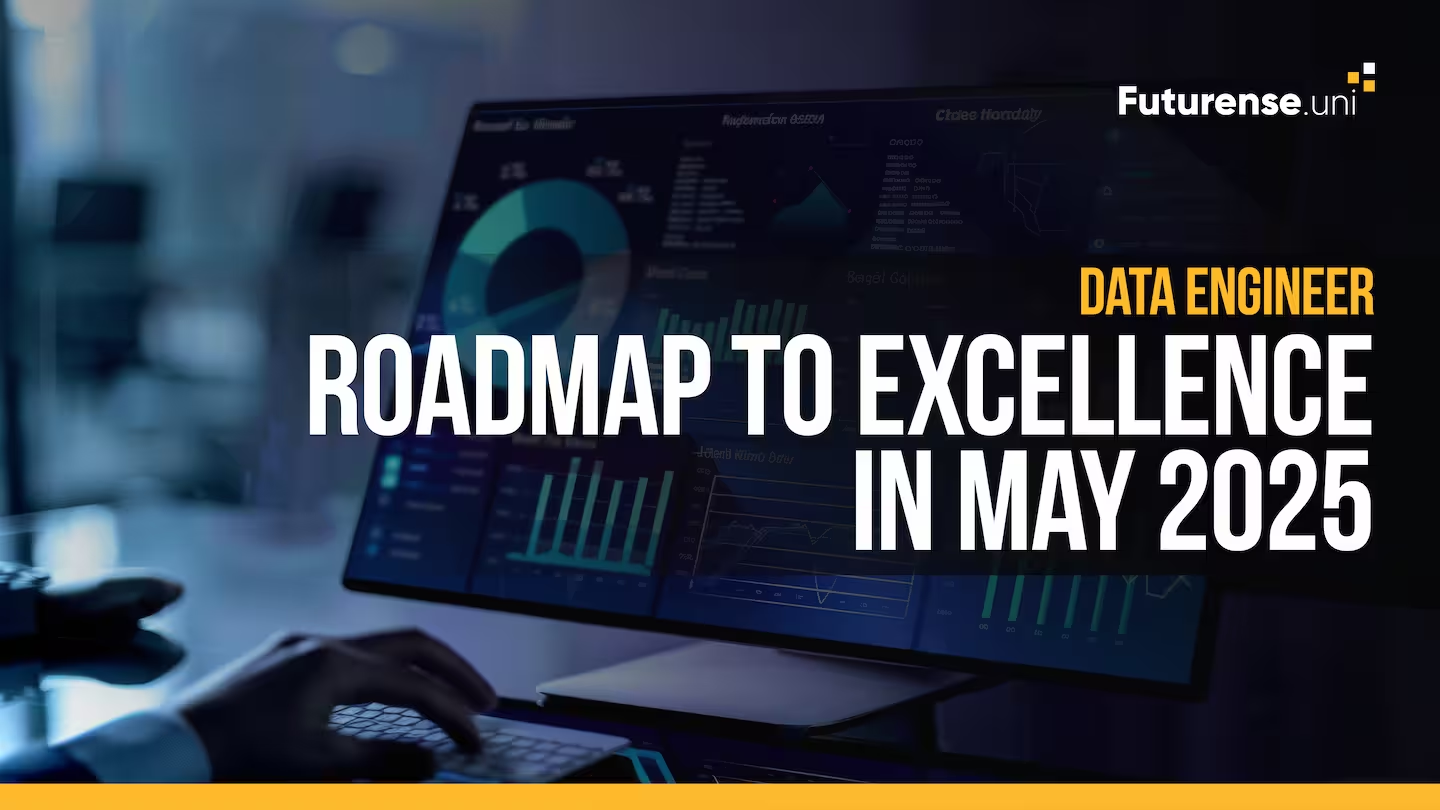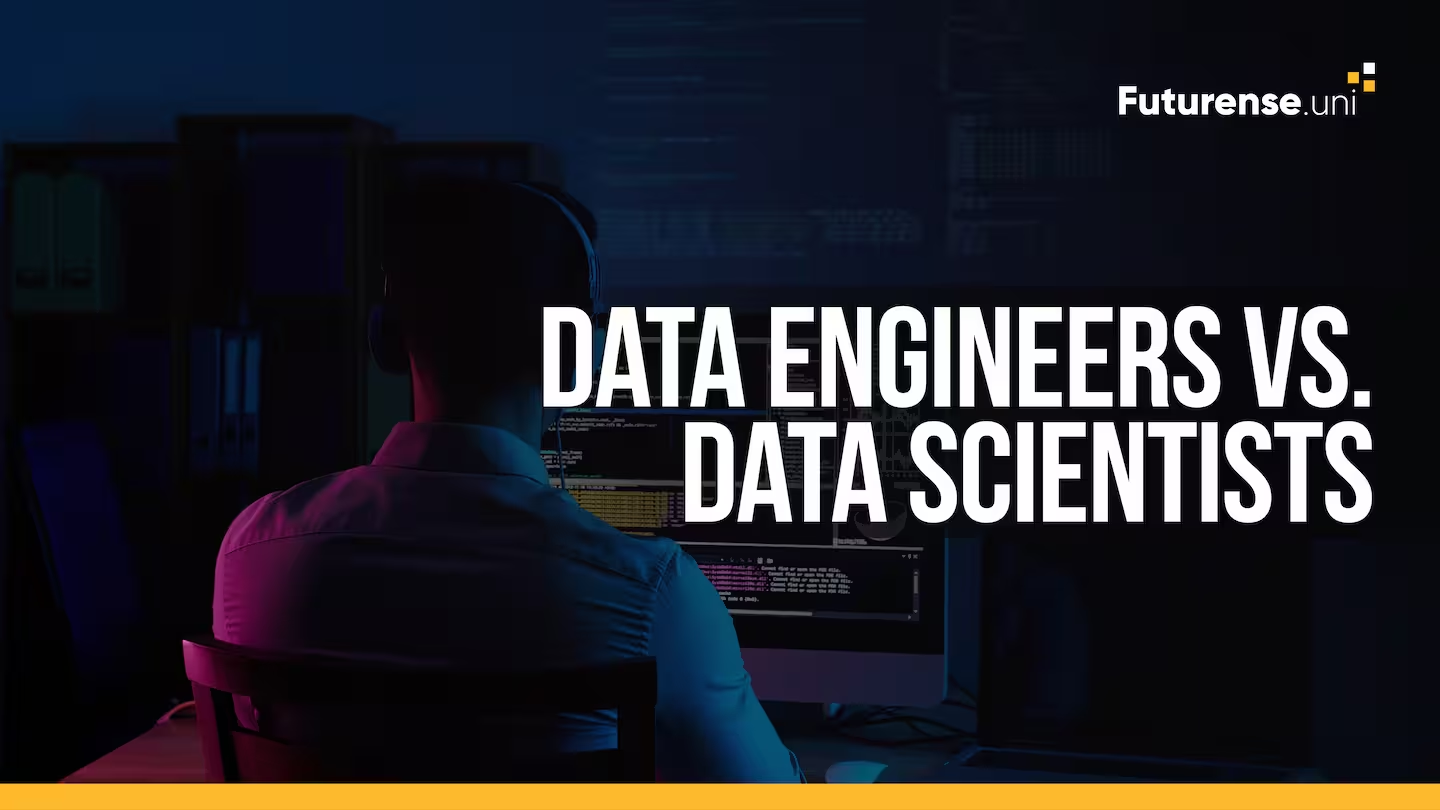Want to become a data engineer in 2026 but not sure where to start? You’re not alone. Whether you’re a fresher or transitioning from IT, this Data Engineer Roadmap will give you clarity and a clear path to follow.
With tools like Kafka, Spark, and Azure now standard in job descriptions, beginning your data engineering journey can feel overwhelming. Is mastering SQL enough? Do you need to learn Python, Airflow, and DBT just to get shortlisted?
This blog simplifies the entire roadmap—covering essential skills, must-know tools, and achievable outcomes. If you want a structured and certified learning path, the IIT Jodhpur x Futurense PGD & M.Tech in Data Engineering program offers exactly that, designed for real-world deployment.
Whether you’re a fresher, analyst, or developer aiming to switch careers, this guide will walk you through:
- Core skills and tools you must master
- Certifications that truly make a difference
- How to build a strong GitHub project portfolio
- Personalized learning paths based on your current experience
Think of this as your GPS—from zero knowledge to deployment-ready—with every milestone and tool clearly mapped out. Let’s get started with your first step on the Data Engineer Roadmap.
Step-by-Step Data Engineer Roadmap (2026 Edition)
To become a successful data engineer in 2026, you need more than just a course, you need a sequence. Below is a six-stage, outcome-driven path that takes you from foundation to job-ready, in just a few months.
Step 1: Learn Python & SQL (Weeks 1–3)
Why it matters: These are non-negotiables. Python handles scripting, APIs, and data processing. SQL handles querying structured data.
Focus Areas:
- Python: loops, functions, file handling, JSON
- SQL: joins, subqueries, window functions, CTEs
Tools: Jupyter, PostgreSQL, SQLite, MySQL
Step 2: Understand Databases & Data Modeling (Weeks 4–5)
Why it matters: Your pipelines will always involve databases, understanding how they're structured is essential.
Focus Areas:
- Relational vs. NoSQL (MongoDB basics)
- Data modeling (Star vs. Snowflake schemas)
- Indexing and normalization
Step 3: Learn ETL/ELT & Orchestration Tools (Weeks 6–8)
Why it matters: ETL and ELT define how data flows cleaned, transformed, and delivered.
Focus Areas:
- ETL vs. ELT workflows
- Apache Airflow: DAGs, operators, scheduling
- DBT: SQL transformations, models, macros
- PySpark basics for big data
Step 4: Pick a Cloud Platform (Weeks 9–10)
Why it matters: Most hiring today is cloud-first. You must know how to build pipelines on at least one platform.
Pick one:
- Azure (DP-203)
- Google Cloud (BigQuery, Dataflow)
- AWS (S3, Glue, Lambda)
Focus Areas: Storage, compute, identity, orchestration tools native to each cloud
Step 5: Build Real-World Projects (Weeks 11–14)
Why it matters: Your GitHub is your resume. Real projects > theoretical knowledge.
Project Ideas:
- Stream IoT data into Snowflake via Kafka
- ETL sales dashboard pipeline using Airflow + DBT
- Batch & stream ingestion into BigQuery
Tip: Add README.md files, code comments, and visuals to make your repo recruiter-friendly.
Step 6: Get Certified & Apply (Weeks 15–16+)
Why it matters: Certifications add credibility and open doors on LinkedIn and job boards.
Top Certs in 2026:
- Futurense x IIT Jodhpur PG Diploma / M.Tech
- Microsoft Azure DP-203
- Google Cloud Professional Data Engineer
Also prepare:
- A clean resume with keywords like “Airflow,” “ETL,” “Azure Data Factory”
- LinkedIn projects section
- GitHub portfolio with 2+ end-to-end pipelines
Also Read: Data Engineers Vs. Data Scientists
Learning Curve: What to Expect at Each Stage
.avif)
Not all parts of the journey are equally challenging. Here's how the learning curve typically progresses:
- Early stages (Python, SQL) are beginner-friendly
- Complexity increases with orchestration tools and cloud platforms
- Projects bring everything together and push your capabilities
- Certifying and applying becomes easier once skills + GitHub are in place
What Skills Are Required to Become a Data Engineer?
To become a successful data engineer in 2026, you don’t need to learn everything, but you do need to master the right combination of tools, concepts, and thinking.
Here’s a breakdown of what matters:
Core Technical Skills (Must-Have)
Advanced & Nice-to-Have Skills
Soft Skills That Set You Apart
- Debugging mindset – You’ll spend a lot of time figuring out what broke and why
- Documentation discipline – Good data engineers write clean code and clear notes
- Collaboration – You'll work with analysts, ML engineers, DevOps, and product teams
Data Engineer Career Path: Titles, Growth & Roles
Data engineering isn't a one-title job. It’s a growth journey with multiple stages. Here’s how your career could evolve:
Bonus Roles That Intersect:
- Analytics Engineer – Data modeling with DBT + BI alignment
- ML Engineer (with DE background) – Serving data to models
- Cloud Data Architect – Designing cross-cloud data infra
Pro Tip: Regardless of your background, real-world projects + GitHub > theoretical knowledge. Tailor your roadmap, don’t follow blindly.
Data Engineering Roadmap for Beginners vs. Experienced Professionals
The roadmap stays the same, but your starting point changes based on your background. Here's how to tailor the journey:
If You're a Beginner or Fresher
Start with:
- Python + SQL
- One cloud platform (Azure/GCP)
- Airflow + DBT
- GitHub projects + certifications
Goal: Get your first internship or junior DE role within 3–5 months.
If You're an Analyst or Developer
Leverage:
- Existing SQL/data experience
- Learn orchestration (Airflow) and big data tools (Spark)
- Shift focus from dashboards/code to pipelines/cloud workflows
Goal: Transition into a mid-level DE role by showcasing transferable skills.
If You're a Cloud/DevOps Engineer
Add:
- Data modeling + warehousing (Snowflake, Redshift)
- Kafka, DBT, CI/CD for data
- Business context: working with analytics/ML teams
Goal: Step into senior data engineering or platform engineer roles.
Final Words: Mastering the Data Engineer Roadmap
The Data Engineer Roadmap is your blueprint for building a successful career in 2026 and beyond. By focusing on core skills like SQL, Python, cloud platforms, and tools such as Airflow, Spark, and DBT, you’ll be equipped to handle real-world data challenges.
Stay consistent, build real projects, earn relevant certifications, and follow a structured path like the one outlined in this guide. With the right mindset and resources, the roadmap to becoming a job-ready data engineer is clear—and entirely achievable.
FAQ: Data Engineer Roadmap
How much time does it take to follow a data engineer roadmap?
It depends on your background. For someone with basic programming skills, it might take 6–12 months of consistent study and project work. For beginners, it may take longer.
Do I need a degree to become a data engineer?
A relevant degree (Computer Science, IT, Data Science) helps, but many data engineers are self-taught using MOOCs, bootcamps, certifications, and hands-on projects.
What projects should I include in my data engineer portfolio?
Examples: building a ETL pipeline, data warehouse design, real-time streaming pipeline, ingestion from APIs, data transformation, integrating with analytics, cloud deployment of data workflow.
Which programming languages & tools should I prioritize on the roadmap?
Start with Python and SQL. Then learn Spark, Hadoop, Kafka, Airflow, AWS/GCP/Azure data services, NoSQL databases, and orchestration tools.
How do I transition into a data engineering role from another role (e.g. software, analytics)?
Focus on learning infrastructure, cloud data services, pipeline design, and the tools above. Do projects that mimic real-world data engineering tasks. Highlight transferable skills (coding, problem solving).









